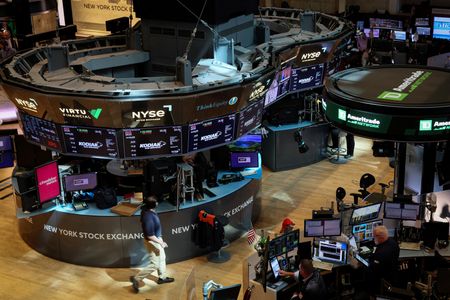By David Randall
NEW YORK (Reuters) -As second-quarter earnings approach, investors are looking at beaten-down sectors which might gain ground regardless of whether the U.S. economy falls into recession this year.
While the benchmark S&P 500 has gained nearly 15% year-to-date driven by a handful of megacap growth and technology names, some sectors have lagged, including the S&P 500 healthcare, which is down 4.7%. The financials sector is down 2%, while energy is nearly 9% lower.
These unloved sectors are growing attractive to investors increasingly torn over whether a long-feared U.S. recession will ever materialize.
Global fund managers increased their allocations to healthcare and banks by about 5 percentage points in June, while cutting holdings of popular recession plays such as cash and consumer staples companies, BofA Global said.
Large asset managers such as BlackRock and Wells Fargo highlighted healthcare as a favored sector in their recent outlooks for the rest of the year.
Some large banks have improved their U.S. economic outlooks, with Goldman Sachs cutting the chance of a recession within the next 12 months to 25% from 35%. The Commerce Department, meanwhile, increased its estimate for first-quarter Gross Domestic Product growth to an 2% annualized rate from its initial 1.3% estimate.
Quincy Krosby, chief global strategist for LPL Financial noted a “tug of war” in the market over the likelihood of a recession.
“But until we hear from companies that they are cutting their labor force, then we think that we will not have a dire earnings season and some of these lagging sectors will become more favorable,” she said.
The U.S. economy added the fewest jobs in 2-1/2 years in June, but persistently strong wage growth pointed to still-tight labor market conditions, new data on Friday showed, all but ensuring the Federal Reserve will resume raising interest rates later this month.
That will likely continue to weigh on stocks overall as borrowing costs increase. Overall, earnings in the S&P 500 are expected to fall 5.7% in the second quarter, largely due to declining margins, Refintiv data showed.
Despite that dim picture, “cheap” valuations and stable healthcare earnings make the sector increasingly attractive to invest in if the economy does slow in the second half, said Sameer Samana, senior global market strategist for Wells Fargo Investment Institute.
The healthcare sector trades at a forward price-to-earnings ratio of 17.6, well below the 20.1 ratio of the broad S&P 500.
“We think the Fed will do whatever it takes to get inflation back down close to 2%, and that’s why we think we will see a Fed-induced recession” in the coming months, he said.
HEALTHCARE, FINANCIALS
Medical devices and diagnostics are still benefiting from a backlog of delayed care during the coronavirus pandemic, and demand could continue to grow regardless of the direction of the economy, said Max Wasserman, a portfolio manager at Miramar Capital. He is bullish on companies such as Abbott Laboratories, which is down nearly 3% year to date.
“As things continue reopening we expect to see more data that confirms that people are coming back into the healthcare system,” he said.
Financials will likely continue to benefit from the Fed rate-hiking and the belief that worst of this year’s regional banking crisis has passed, said Tom Ognar, a portfolio manager at Allspring Global Investments.
He is focusing on companies such as LPL Financial Holdings Inc and Morgan Stanley in the wealth management sector that appear to have more secular growth opportunities than the big banks, he said.
Big banks start reporting second-quarter results next week.
“If rates stay higher for longer and the Fed has to battle inflation for longer that will only mean that these companies will earn more for longer and buy back more stock,” he said.
A market shift away from the handful of megacap technology and growth stocks that have powered the rally in the S&P 500 is not a given, cautioned John Quealy, chief investment officer at Trillium Asset Management.
“The cash flow profiles of some of those (megacap) companies are tremendously attractive, especially if we fall into a recessionary environment.”
Overall, the Russell 1000 Growth Index is up 27.5% year to date, compared with a 2.9% gain in the financials and healthcare-heavy Russell 1000 Value.
Yet a continued rally in megacaps will likely stretch their valuations further, prompting some investors to rotate toward healthcare and financials, LPL Financial’s Krosby said.
“Everything is at a discount.”
(Reporting by David Randall; editing by Megan Davies, Michelle Price and Richard Chang)





